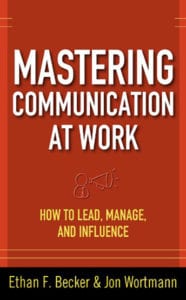Speech coach Dr. Ethan Becker joins Meny Hoffman to talk about the power of speech and share some practical advice on overcoming the fear of public speaking.
When you know how to harness the power of speech, you’ll be able to dominate any business environment—whether it’s negotiating with a client, a vendor, or managing employees. That’s why I’m excited to share my interview with Dr. Ethan Becker, the President of The Speech Improvement Company and a second-generation speech coach and trainer. Ethan has developed powerful, customized motivational training programs on communication and delivered them worldwide. Celebrity icons and major business leaders hire Ethan to control their fear of speaking, command greater attention and close larger deals. His book, Mastering Communication At Work, is an international bestseller and has been used by Harvard, Johns Hopkins, University of Texas, and many other schools.
Listen and enjoy!
Listen to the podcast here:
Download the audio file here.
How to Master Communication at Work With Dr. Ethan Becker
Our guest is Ethan Becker. He discovered from a very early age that if you know how to harness the power of speech, you would be the most powerful person in any room. He went on to become the youngest, highest-paid marketing executive of a very large corporate company, and then decided to go off on his own. Celebrity icons and major business leaders hire Ethan to control their fear of speaking, command greater attention, and close larger deals. His book Mastering Communication At Work is an international bestseller and has been used by Harvard, Johns Hopkins, University of Texas, and many other schools.
I love this episode because we talk all about public speaking, but not only on stages but also in your company, with your team, and one-on-one conversations when you need to speak to clients or prospects. In our interview, Ethan discusses how you need to go about effective speaking and also the ABC of why most people have the fear of speaking. We go into details and practical advice on how to overcome it, especially when you are hit with defensiveness, how to turn that conversation around in a productive way and turn it into a positive conversation.
—
Ethan, thank you so much for joining me on the show.
It’s great to be here. Thanks for having me.
I’m excited about this episode and our audience will be as well. Our topic is all about communication. I want to speak about various specific no-nonsense advice so people who read this can improve communication at home, at work and in everything they do, especially if they are speaking in public. Before we get there, tell our audience a little bit about yourself and your past history as to how you got to be the expert that you are in this field.
I’m what’s referred to as a speech coach. I’m a second-generation speech coach. The company I’m with, The Speech Improvement Company, is the oldest speech coaching and training firm in the United States. We started in 1964. Both my mother and father had PhDs in speech communication. They started this concept of executive coaching back in the 1960s. Now there are fifteen of us around the world. What we do is we study speech communication, and then we work with business leaders and people all throughout organizations on communication. Whether that’s leadership or management communication, presenting, articulation, clarity, psychology, being comfortable, controlling nerves, being persuasive, all of these things that are related in the business world. We do it through group training and private coaching. We do it all over the world. At a high level, that’s what we do. We’re based in Massachusetts, but we do travel.
I guess in your household as you grew up, speaking was never a challenge.
We’re all human so one of the lessons is that we’re not going to be perfect. People who tell you that they’re going to make you a perfect presenter or a perfect speaker, you should run the other way.
That is the first lesson for our audience.
I like to use the word ‘effective’ but not ‘perfect.’ Perfection is an illusion. We’re going to make mistakes, but with a little bit of practice, skill and technique, we can become incredibly effective in all these different business environments whether it’s negotiating with a partner, or a vendor, or managing employees. It’s about that practice and you can. In my household growing up, we had a lot of fun in the dinner table.
[bctt tweet=”When the nervousness becomes so significant, it begins to interfere with our ability to be clear and effective in what we’re trying to do.” username=””]
Let me dive into the conversation head-on. This is something you probably have spoken about many times, but I think it’s important for a lot of the people to hear it from you and see how your approach to it. You could see where there maybe 5, 7, 8 people sitting in the room and they’ll be leading the conversation, but as soon as they get out of their comfort zone, they can’t almost speak. What is it? Sometimes you could say it’s fear, but they are people with the least fear in other areas of their life. How do you head-on tackle this conversation when you talk about speaking in public, speaking in general, or speaking for your team? What is it that’s standing in the way of people to be their best and speak their minds?
When we hear comments, we hear things like fear of speaking which is formerly what people would refer to. We often hear things like it’s one of the most common fears in the United States, worse outside of the United States. It’s higher than death. There are more people who experience this fear of public speaking than death. That’s not new news. I know a lot of people may have heard that, but the issue is why? Why is this so widespread? The reason is that it’s different for different people. For example, there are some people who can stand up in front of a large group of a thousand and be relaxed and fine.
Then they stand up in front of a small group of four at a board meeting and they’re nervous. For somebody else, it’s the opposite. In the small group, they’re fine and in the big group, they’re not. For somebody else, it has nothing to do with the number of people in the group. It might have to do with their own psychology and their own belief system. They might be comfortable and confident in one area or on one topic. All of a sudden, out of nowhere, it hits them in another situation. That’s the reason it’s widespread. The good news is we can help people with it.
From your practice, what is it? Is it more of a mindset that as soon as you crack that, automatically the person opens up or is it something more than that?
That’s a piece of it. It has to do with our belief system. For those of you out there reading, if you experience this, think of it like this, ABC. A stands for the activating event. If I had a fear of flying, my A might be the act of getting on the airplane. In a fear of public speaking, my A might be standing up in front of a group. Which group? I don’t know, that’s unique to you. C stands for the consequence. My hands shake, I lose my train of thought, my voice quivers, or I’m not breathing normally. In our mind, A causes C to happen, which sounds good except for the fact that that’s not true. B stands for your beliefs about A. It’s what you believe about A that causes C. B causes C to happen. For example, “I believe I’ll be nervous. I believe I’ll make a mistake. I believe they’ll laugh at me. I believe this will lose the deal,” whatever those beliefs are. Whether they are, accurate or not, is a different issue, but it is the beliefs that are there.
When looking to control it long-term like in some cases, it can go away completely. I’m careful with language, not to say things like ‘overcome’ because some people will never overcome a fear of public speaking, but that’s okay. Being nervous is not often reported as the problem. A lot of people get nervous. I get nervous sometimes and I’m a professional speaker. It’s when the nervousness becomes significant that it begins to interfere with our ability to be clear and effective in what we’re trying to do. That’s when you’ve got to address it. One part of that story is to say, “Let’s look at the belief system.” You break it into the rational and irrational beliefs that we have. Usually working with a coach, you can certainly work through that in a real and authentic way that is effective.
What would you say is the most common belief that would hold back a person from doing a good job in speaking?
The top ones are, “I believe I’ll be nervous. I’ll make a mistake. I will look bad. I’ll forget what I’m going to say. I’ll trip on the stage.” These are all common ones, but you might have unique ones. They might be specific to a person, “I believe that Tom will not think that I’m good at my job.” It might be that precise. You’ve got to identify that. If you’re working on this by yourself, start by writing them down. You can keep what we call a fear of speaking journal. When you experience it at a meeting or at work, as soon as you have a chance to be alone or when you can, write down what you were thinking, “I believe that my promotion was at risk,” or, “I believe that the whole company is expecting me to look amazing and I’m going to screw it all up.” Write it down because when we can see it, now we can discuss it.
Sometimes it’s a matter of talking through it with your coach. In some cases that isn’t enough. It’s not just about talking it through. It’s not just saying, “I’m good enough and people like me.” It’s not that. Sometimes you have to learn the skill. For example, some people might say, “I believe I won’t be loud enough.” You can’t think your way to being louder. You might need to practice volume with a coach. You may not change or update your belief system until you’ve watched back a recording of you with louder volume. Practice it again and again until it becomes comfortable for you. It’s like a sport.

One of the things that you hear a lot is people on stage try to compare themselves to other speakers. I know that the belief or everything we discussed like the ABC, they’re trying to come up with those excuses or whatever stuff they have to overcome or the beliefs they have to change because they’re comparing themselves to other speakers. You being a coach, how do you tackle that issue when I’m going to be on stage right after Gary Vee. How do I stand on stage and have people pay attention to me?
There are a couple of thoughts in there with what you said. I’ll start by saying that you’re right that a lot of people are worried about that. It’s one reason I’m not a big fan of TED. I enjoy TED. I like watching TED Talks but from a coach’s perspective, there’s a lot of clean up I have to do because people think that that’s real, that what you see in a TED Talk is good real-world presenting. It is very scripted and crafted presentation of an idea. There are certain environments where it’s an outstanding approach like at a conference if you’re a conference speaker. It’s not the only approach but it’s one. If you try to take that approach at a board meeting or with a customer, they’re probably going to kick you out.
It creates anxiety. Not to mention there’s a high level of practice. They don’t promote the videos of people who are lousy speakers. This contributes to the anxiety in our mind. In the research we’ve done, there are four areas that contribute to the fear of speaking as a grownup. When you’re young, we call it caring adults. You’re about two years old and it’s the first time in your life that you experience a consequence. You’re two and you go knock over some hot tea and somebody says, “No, don’t touch that.” That’s a consequence but before that moment in your life, there was no such thing as a consequence. It’s not to say, “Don’t say no to children.” It just starts young. The second area is the school. That tends to be the first time in our lives that we experience or witness some form of public humiliation.
The third one is television. This is where maybe TED or conferences might even come in because on television, we’re observing other people and thinking, “That’s the way I’m supposed to be.” Even though it’s not real. They’re actors and scripts who’ve put a lot of work into it. When we can’t stand up and do it, we feel nervous about ourselves. The fourth one is what we call the thing. We call it that because our clients always say, “I’ve got that thing coming up next week. I got the thing to do.” The idea of the presentation can overwhelm us. These are contributors to this experience that we have as an adult. You can learn to control it. It’s different for everybody, but part of it is the belief system.
You mentioned the question, “How do I go up after this person and get people to listen to me?” Part of that goes not so much about your belief system, but in your preparation, practice and the content. We look for example. There’s an outline that we teach that’s in the book, Mastering Communication at Work: How to Lead, Manage, and Influence. That’s an international bestseller, Amazon bestseller in thirteen categories. It’s a good business book. There’s a section there that captures the outline that we teach all over the world on organizing a presentation. One piece of that outline is to tell your listeners why they should listen to the topic.
That’s a simple and often overlooked component. This is not a gimmick. This is not a trick. I’m not a fan of hooks because that’s a negative connotation. It’s a practical business reason. Why are you talking about this? Who cares about the topic you’re talking about? You got to say that near the beginning. When you do, it engages the mind of the listener. Even if they don’t like you, even if they don’t like the topic, they at least understand why you’re talking about the topic. It pulls them right in no matter who’s speaking before or after you.
Let me ask you a broad question and then I want to shift the conversation a little bit more to business leadership and speaking more of an intimate setting as far as your team. There are different people with different skillsets and different things they need to do in their life. There are different fears and different things that they’re afraid doing. Based on your experience and for the people reading that are thinking to themselves, “I’m never going to be a public speaker. I’m never going to be able to open my mouth when there are plenty of people in the room,” what do you tell them?
[bctt tweet=”Sales and communication go hand in hand.” username=””]
It’d be easy to say, “Sure, you can.” The reality is it’s different for different people. There are some people who probably will struggle most of their lives. Those are extreme cases and when I say extreme, they usually will have a hard time even calling us because the idea of picking up the phone is terrifying. In those cases, when we’re aware of them, we refer them to a psychiatrist. That’s not the majority. The majority still go to work. They talk all day long. They’re just not viewing it as talking or presenting. They’d like to come out of their shell. You can learn to do it because speech is a behavior just like any other behavior.
When my son first learned to play the sport of lacrosse and he had a stick in his hand, he’d throw the ball and the ball would go straight into the ground and it’s awkward. He’s like, “I’m never going to get this.” He stuck with it and now he’s a good lacrosse player. He can throw the ball where he wants. That does not happen overnight. In speech and speaking, for many people, it begins automatically at birth and some research says before birth. For the most part, at birth, we begin to learn and comprehend sounds that we hear and we begin the process of imitation to then be able to create those sounds. We take these thoughts in our mind and articulate them. Everybody’s had different experiences at home, on television, at school and all of these things.
That’s why as adults, we’re all a little bit different. When working with a coach, you can sit down, and this is what we do when we profile. When I meet somebody for the first time, I’m saying, “What’s working here?” In the business world, for many people, something’s working or they wouldn’t even be where they are now. It’s important to know what we’ve got to work with. From there we say, “What’s missing?” Maybe it’s the articulation. Maybe it’s getting your thoughts clear. Maybe it’s learning how to adapt your communication style to the person you’re talking with so that you can get through to them. Whatever it is, there’s a teaching process that’s happening, then coaching, and then practice.
It is why speech coaching is not the same as executive coaching. Executive coaching is more like, “Let’s discuss your goals.” Good executive coaches should never be trying to teach people public speaking skills. They should be saying, “Let’s see if we can find you a good speech coach to work on that particular skill.” This is how we often operate and then people come to us as specialists to dive in like a surgeon would say, “Let’s fix this. You don’t need to fix that. That’s great. Don’t worry about that. Nobody cares about that. You got to get better at this.”
Speaking about leaders managing teams and growing their own companies, how important is it in leadership to have the capacity to do public speaking in the capacity of their own company?
I think it’s always important. That’s an easy thing to say. I’d say it depends on the company size. One of the challenges that we often see in a large company where there are hundreds or thousands of employees, that’s one experience. Leaders can come in and they can use the textbook business school techniques to manage and lead. It’s expected and it’s accepted. There’s often training that is happening. We do a lot of this training. Then there’s the small business that’s looking to grow or that’s in a growth mode. The challenge is, at what point in that storyline do I as a business leader need to change from my autopilot communication or what got me here to more thoughtful, mindful communication with the people that I’m working with? At what point does that happen? I don’t think it’s a switch.
One could argue, it happens the moment you have more than one person in your company. The reality is the one person, the second person, the third person, it’s a lot easier to get those people to see your vision in many cases. At a certain point, now the company is larger with 30 people, 40 people, or whatever the numbers are. It’s making the conscious decision to say, “I need to become more aware. This is how I think and what I think, but how does that person need me to say it?” That’s tough for people because a lot of people will say, “I’m not going to change who I am. I am who I am.” Be who you are but be accurate when you speak. A lot of times, we’re not. We say things the way we think people want to hear it and we’re either going to get through or not. If you want to get through, say it in a way they can understand.
There’s a topic that you discuss a lot which is how to handle defensiveness and move it into a positive or more productive way. Would you mind sharing that for a person sitting in a room and gets into that type pf conversation?

There’s a good chapter in the book on handling defensiveness. In psychology we referred to it as defensive persuasion. At a high level, what you need to be able to do is validate effectively and reframe your conversation in a direction. Defensiveness specifically validates effectively. What do I mean by that? Validation is tough especially when we don’t agree with somebody because in our mind, we think that validation and agreement are the same things, but they’re not. If I agree with you, that is a form of validation. If you said to me, “Ethan, I think you should go jump off the roof,” I don’t want to jump off the roof. I’m not going to validate or I’m not going to agree with you. I might say, “How high do you think I ought to go?” “The very top.” That’s helpful for me to hear. I’m not going to jump off the roof because I’d be dead. You got to somehow validate the person’s point of view.
We hear people say common things like, “That’s a good question.” That’s the textbook and people make fun of that one. “I appreciate that you ask that,” some people make fun of that one too. “I’m glad you brought that up,” these are generic things to say. A lot of it is your tone of voice. Here are some practical techniques. If you feel like “Good question. I’m glad you brought that up” are coming across as fake or superficial, first of all, they should not be. You got to check your own attitude because if somebody’s saying something, whether you want to hear it or not, telling them that you appreciate their point of view or that you want to learn more about it should be authentic.
If it’s not coming out that way, add the word because at the end of the sentence. That will force you to come up with a reason. As an example, I might say something like, “I’m glad you brought that up because this is the type of thing that if we don’t talk about it, we’re not going to find a resolution. Let’s keep talking about some ideas to solve the problem.” That validator will begin to lower the defensiveness. Lowering defensiveness does not mean the other person is going to agree with you. In many cases, they may, but it minimizes the defensiveness so that at the very least, you can have high-quality communication about the topic. Even if the answer is still no, your relationship is much stronger when you’ve invested a little bit of time into this. In the book, we talked about a specific four-step process that you can train yourself to do in these situations when somebody is feeling defensive about an idea.
Let’s start the conversation about sales. When it comes to sales, great communication is the heart of the pitch. What are some practical ways salespeople can increase sales through better speaking skills like figuring out the conversation or leading the conversation towards the sale?
Sales and communication go hand-in-hand. Training sales teams is often enjoyable for us because they can easily identify with the need for better communicating. I’ll give you an example, Aristotle was one of the early philosophers that we look at in the world of speech communication. One of the things that he talked about is people tend to think and process either as an inductive speaker or a deductive speaker. Here’s what it means. If I’m an inductive speaker or thinker, that means you need to give me the background information first, all the details, and the value proposition, then tell me the point, then tell me what you want. If I’m a deductive thinker or speaker, you’ve got to tell me the point at the beginning or near the beginning, then you give me the background information.
This is an important concept for people in sales to understand. We do a lot of cleanup from a lot of the sales programs that are out there. Most of them teach an inductive approach, “Don’t tell them the price until you’ve made sure they heard the value.” That’s great and all except sometimes what the client hears is this, “$5,000.” They didn’t hear anything because in their mind, they needed it in a deductive way. They needed to hear the price near the beginning. There were some people that will make a badge of honor how much they made the client or the customer wait. It’s hysterical. The best salespeople that we’ve ever seen naturally switch back from inductive to deductive even in mid-conversation if they need to. It happens to be chapter one in my book, but it’s an outstanding skill to learn for any sales professional.
Generally, speaking one-on-one, persuading, leading in the conversation, we live in a world of the digital age where communications are happening in person, over the phone, on email, social media. Based on your practice, how much of the tone of the conversation is being changed based on the medium versus what needs to be addressed? Do people have to have a different lingo or a different way of approaching and validating the conversation or moving the conversation forward with different mediums? Is it done all the same based on the person?
We’re still figuring it out a little bit. There are a lot of people that will say, “If you want to connect with Millennials, you better learn how to do fill in the blank.” I like the concept of that because it’s saying, “I have thoughts in my head and I want you to know them. What’s the most effective way for me to get you to know them?” Conceptually, that’s a good thing. The challenge is that it’s often done poorly, or a lot of the intended messages are lost in the process. That doesn’t mean don’t do it. It means if you’re going to do it, do it well. Learn the technologies. They’re here. Where we see this in businesses is across generations most frequently. Somebody who’s in an older generation, the Baby Boomer generation, they may be talking with somebody during the meeting and that person is texting. That older person immediately interprets the message as rude and disrespectful, and now they’re distracted. That may not be what the younger person meant or intended.
The younger people were raised with the ability to watch TV, read a book, listen to the radio, talk to somebody, text, write an email all at the same time. They’re used to that. The reverse is true. When we coach, a lot of times we’re coaching people who are new to the business world. We say, “If you want to get ahead, if you want to connect with the GenXers that are running your company, then learn to communicate the way they do. When you’re in a meeting with them, don’t start checking your phone.” It’s not like, “Do it or else.” If you want to make a connection, communicate the way those people are or respect that environment and you’ll do much better. That’s what I would recommend.
[bctt tweet=”You need to be able to use language and frame it so that the other person can hear and understand.” username=””]
There’s a saying that I use a lot which is, “Be yourself. Everybody else is taken.” There are skills and improvements a person could do to do speaking in private, speaking in public. From your experience, how much would you guide people to not change their style? Meaning to say, “Don’t try to be someone you are not. Don’t try to come across conversations that are not matching your personality.”
I would say always be yourself and you always will be you. What we’re looking at in communication is, are you being effective at communicating? If I’m talking with somebody who maybe speaks in broken English, I’m not going to show up and like, “What’s up, man? How are you doing?” That’s not me. That’s not how I speak. At the same time, I need to be able to use language and frame it in a way that that person can hear and understand. In the business environment, there’s enough of a middle ground for people. We know what best practices are. Why are they best practices? It’s because people can then understand each other. You’re going to be yourself.
One of the things that we do here is what we call style coaching. This is more of a senior executive type of service that we do. We ask the client, “How would you like to be perceived? If people were talking about you after a meeting and they said, ‘Ethan, he’s this and this,’ what words would you like them to say?” As you learn the technique on how to be clear, how to organize your thoughts or how to be persuasive, that style is a part of the process. It becomes authentic. Along the way, does it feel uncomfortable? It may in many cases but consider this, I coached soccer for years with the kids. A lot of these kids could come in and kick with their right foot.
They were good at it but in a game, they’d be on the other side of the ball. They’d run-up to the ball, stop, back up, and then run so they can kick it with the right. That’s no good. They have to kick it with the left. They have to know how to kick it with the left. I would train them that. We would take the right shoe off at practice. I would tell the kids, “If you score with your right, I will tell the ref not to count the point.” They’d get all mad. “I’m not good with this. That’s outside of my comfort zone. That’s not me.”
It’s like how we hear adults complaining about learning communication, “That’s not who I am.” It’s not about you being an effective communicator in particular in the business world. It’s about your listeners and what they need you to be in order to receive the message. Otherwise, unintended messages are what are sent and what are received. It takes a little practice. It might be uncomfortable at first, but then that’s a matter of practice. Kicking with your left is uncomfortable until you nail it and now you can. The best soccer players in the world don’t even think about which foot they’re kicking with. It becomes their new authenticity.
Let’s close with four rapid-fire questions. Number one, a book that changed your life.
Number two, a piece of advice you got that you’ll never forget.
Be humble in your confidence.

Number three, anything you wish you could go back and do differently.
Not really, nothing comes to mind.
Most people answer that. Number four, what’s still on your bucket list to achieve?
Directing Hollywood movies.
Ethan, thank you so much for joining us. I know your time is valuable and that is why in the name of our audience, we will forever be grateful for sharing some of your time with us.
Thanks for having me.
Links Mentioned:
- Mastering Communication At Work
- Ethan Becker – LinkedIn
- The Speech Improvement Company
- Good to Great
About Ethan Becker
 As President of The Speech Improvement Company, Ethan is a second-generation speech coach and trainer. While he’s worked with business partners all over the United States, he also has unique international experience. He has developed powerful, customized motivational training programs on communication and delivered them worldwide. Ethan’s experiences have provided him with a valuable cultural perspective that he brings to his clients.
As President of The Speech Improvement Company, Ethan is a second-generation speech coach and trainer. While he’s worked with business partners all over the United States, he also has unique international experience. He has developed powerful, customized motivational training programs on communication and delivered them worldwide. Ethan’s experiences have provided him with a valuable cultural perspective that he brings to his clients.
He is co-author of the international best selling business book “Mastering Communication at Work, how to lead, manage, and influence” published by McGraw-Hill.








